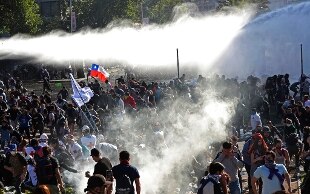- Chile, 2 dead charred in the assault on a department store. Serious budget casualties
- Chile in chaos, army in the street and curfew: as in the days of Pinochet
- Chile, state of emergency after violent protests, burning Enel building
- Protests in Chile due to the increase in the metro ticket: state of emergency declared
Share
21 October 2019The result of this weekend's violent protests in Chile has risen to 11 dead. This was announced by Karla Rubilar, superintendent of the Santiago metropolitan region, quoted by the Chilean media. The figure brings together the three dead on Saturday and the eight of ages, who died in fire during looting .
Five men died from a fire in a textile company warehouse, four in supermarkets and two in a building products store.
Rubilar said that today "although it is a complex day, a difficult day", people "can move with greater normality".
But the violent protests do not calm down. Today, demonstrators attacked the registry offices of Lo Espejo, a town south of Santiago de Chile, burning them and causing major damage.
Firefighters rushed to the scene, extinguishing the flames, and Commander Jaime Flores confirmed that the fire was caused by a group of protesters who ransacked the premises. Flores added that the damage caused is important because many records were destroyed.
Interior Minister Andrés Chadwick released data on what is happening in the country: 960 people were arrested in the last hours for 103 episodes of violence, 50 registered in the Santiago region and 53 in the rest of the country. The wounded agents would be 62. Eight police stations were destroyed and seven between bus and metro. Moreover, the minister has announced that the "carabineros" and the military of the armed forces are mobilized.
The stages of the crisis: from 'evasiones masivas' to curfew
Chile has been the scene of a social uprising since Friday, with daily protests accompanied by looting, to which the government of President Sebastian Pinera has responded by imposing a state of emergency and a curfew. It is the first time that the army has returned to patrol the streets since the end of the dictatorship of General Augusto Pinochet, who remained in power for 17 years (from 1973 to 1990) after the coup against Salvador Allende. The following are the stages of these days of dispute.
Friday 18 October - After days of protests called 'evasiones masivas', in which students passed the turnstiles of subway stations to avoid paying the ticket against the government's decision to raise the price, clashes between protesters and agents break out in Santiago.
The decision contested by the demonstrators, mainly young, is to increase the cost of metro tickets during peak hours from 800 to 830 pesos (equal to 1.04 euros); this is the second increase in just a few months, as the cost had already risen by 20 pesos last January. The day before, Thursday 17 October, 33 people had been arrested for extensive damage to the metro stations in the capital.
The Santiago metropolitan network is the largest (140 kilometers) and the most modern in South America. The authorities close the metro stations. On the evening of Friday, October 18, conservative president Sebastian Piñera decreed a state of emergency in Santiago and entrusted a military, General Javier Iturriaga, with the responsibility of ensuring the safety of people. The presence of the army in the streets was not seen since the days of Pinochet.
Saturday 19 October - Thousands of people demonstrated again in Santiago, but also in other major cities of the country, such as Valparaiso and Viña del Mar. Many cacerolazos. President Sebastian Piñera tries to calm the crisis by announcing the suspension of the increase in the price of metro tickets. General Iturriaga, meanwhile, decreed the total curfew in the capital starting from 1 GMT on Sunday, that is from 22 local. Two people die in the fire of a supermarket on the outskirts of Santiago, which broke out following a looting, and another person is seriously injured.
Sunday 20 October - The riots continue despite the announcement by Pinera of the cancellation of the increase in ticket prices. Demonstrators complain about socio-economic conditions and inequalities, as well as crisis management with army intervention.
In the afternoon, clashes between demonstrators and police break out in the center of Santiago. They also take place looting in different areas of the capital. Five people die in the fire of a looted garment factory, north of Santiago, leading to at least seven death tolls since the beginning of the riots. A curfew is decreed for the second consecutive night in the capital, this time anticipated from 7 pm local time at 6 am (ie from midnight to 11 am Italian time). The curfew, at different times, is also imposed in other cities, including in the provinces of Valparaiso and Concepcion.
In addition, the state of emergency from Santiago is extended to nine of the other 16 regions of Chile. More than 10,000 policemen and soldiers are deployed. There are reports of violations of rights by agents, with numerous videos circulating online.
Pinera holds a controversial, highly criticized speech in which he states: "We are at war against a powerful, implacable enemy who respects nothing and nobody and is ready to use violence and delinquency without any limits". At Santiago airport thousands of passengers, whose flights have been canceled or have been delayed, spend the night locked inside, due to the curfew and the absence of public transport.
According to the count of the authorities, 1,462 people were arrested, of which 644 in the capital and 848 in the rest of the country. The Chamber approves the bill presented by the government to cancel the increase in the price of metro tickets; the provision will also be approved by the Senate today, Monday, which will be a national strike day.

